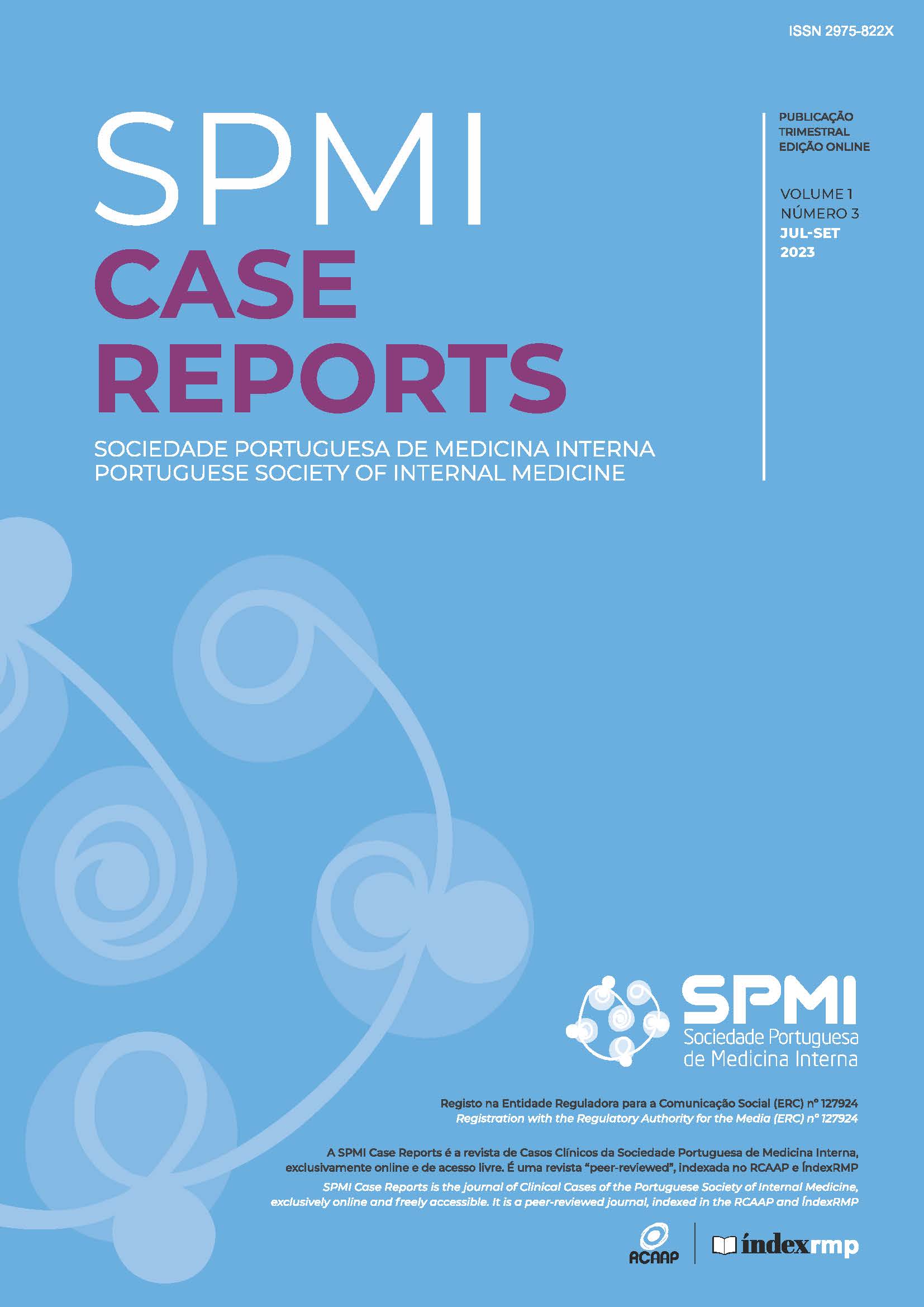Síndrome de Lise Tumoral em Carcinoma Hepatocelular Multifocal sob Sorafenib e Infeção SARS-CoV-2
DOI:
https://doi.org/10.60591/crspmi.74Palavras-chave:
Carcinoma Hepatocelular, COVID-19, Rasburicase, ; SARS-CoV-2, Síndrome de Lise Tumoral, SorafenibResumo
A síndrome de lise tumoral é a uma emergência médica potencialmente fatal decorrente da lise celular maciça que ocorre em neoplasias malignas com grande carga tumoral.
Ocorre sobretudo em neoplasias hematológicas sob quimioterapia, sendo menos frequente em tumores sólidos, os quais apresentam geralmente um menor índice proliferativo. A síndrome de lise tumoral no carcinoma hepatocelular tratado com sorafenib, um inibidor oral multicinase, é extremamente rara, descrevendo-se apenas nove casos na literatura. Tanto quanto sabemos, não existem casos descritos na população europeia. Apresentamos um caso de síndrome de lise tumoral num doente com carcinoma hepatocelular multifocal sob tratamento com sorafenib e infeção SARS-CoV-2.
Downloads
Referências
Cairo MS, Bishop M. Tumour lysis syndrome: new therapeutic strategies and classification. Br J Haematol. 2004;127:3-11. doi: 10.1111/j.1365-2141.2004.05094.x.
Llovet JM, Ricci S, Mazzaferro V, Hilgard P, Gane E, Blanc JF, et al. Sorafenib in advanced hepatocellular carcinoma. N Engl J Med. 2008;359:378-90. doi: 10.1056/NEJMoa0708857.
Durani U, Nilay DS, Ronald SG. In-Hospital Outcomes of Tumor Lysis Syndrome: A Population-Based Study Using the National Inpatient Sample. Oncologist. 2017;22:1506-09. doi: 10.1634/theoncologist.2017-0147.
Criscuolo M, Fianchi L, Dragonetti G, Pagano L. Tumor lysis syndrome: review of pathogenesis, risk factors and management of a medical emergency. Expert Rev Hematol. 2016;9:197-208. doi: 10.1586/17474086.2016.1127156.
Huang WS, Yang CH. Sorafenib induced tumor lysis syndrome in an advanced hepatocellular carcinoma patient. World J Gastroenterol. 2009;15:4464-6. doi: 10.3748/wjg.15.4464.
Joshita S, Yoshizawa K, Sano K, Kobayashi S, Sekiguchi T, Morita S, et al. A patient with advanced hepatocellular carcinoma treated with sorafenib tosylate showed massive tumor lysis with avoidance of tumor lysis syndrome. Intern Med. 2010;49:991-4. doi: 10.2169/internalmedicine.49.3153.
Shiozawa K, Watanabe M, Takenaka H, Nagai H, Ishii K, Sakai K, et al. Tumor lysis syndrome after sorafenib for hepatocellular carcinoma: a case report. Hepatogastroenterology. 2010; 57: 688-90.
Abbass K, Dewani S, Markert R, Kaplon MK, Baumann MA. All that glitters: sorafenib. Intern Med. 2011;50:797. doi: 10.2169/internalmedicine.50.4858.
Habib G, Nashashibi M. Fatal tumor lysis syndrome following sorafenib treatment. J Med Cases. 2013; 4: 269-70.
Kudo C, Miura M, Gamoh M, Niitani T, Tamagawa H, Takahashi K, et al. Tumor lysis syndrome after treatment with sorafenib for hepatocellular carcinoma. Int Cancer Conf J. 2015:147-50.
Kim SY, Kim HY, Kim YS, Lee SM, Kim CW. Tumor lysis syndrome following sorafenib treatment in hepatocellular carcinoma. Yeungnam Univ J Med. 2015; 32: 47-9.
Imam SZ, Zahid MF, Maqbool MA. Sorafenib-induced tumor lysis syndrome in a patient with metastatic hepatocellular carcinoma. Hematol Oncol Stem Cell Ther. 2020; 13: 168-70.
Chou JW, Cheng KS, Akella T, Lee CC, Ju T. Tumor lysis syndrome in patients with hepatocellular carcinoma: a systematic review of published case reports. Cureus. 2021; ;13:e19128. doi: 10.7759/cureus.19128.
Klann K, Bojkova D, Tascher G, Ciesek S, Münch C, Cinatl J. Growth Factor Receptor Signaling Inhibition Prevents SARS-CoV-2 Replication. Mol Cell. 2020;80:164-74.e4. doi: 10.1016/j.molcel.2020.08.006.
Downloads
Publicado
Como Citar
Licença

Este trabalho encontra-se publicado com a Licença Internacional Creative Commons Atribuição 4.0.




